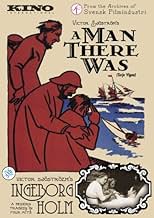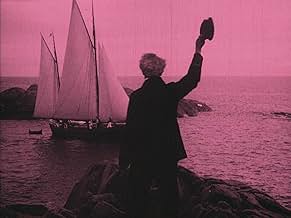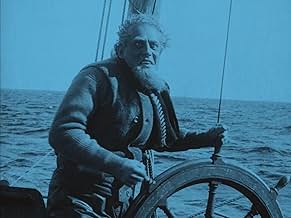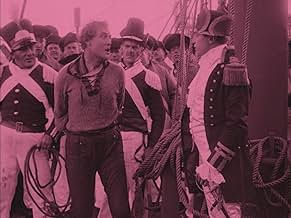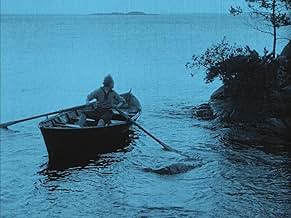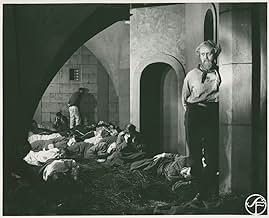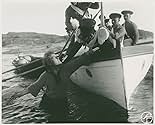IMDb RATING
7.3/10
2.5K
YOUR RATING
Terje Vigen, a sailor, suffers the loss of his family through the cruelty of another man. Years later, when his enemy's family finds itself dependent on Terje's beneficence, Terje must decid... Read allTerje Vigen, a sailor, suffers the loss of his family through the cruelty of another man. Years later, when his enemy's family finds itself dependent on Terje's beneficence, Terje must decide whether to avenge himself.Terje Vigen, a sailor, suffers the loss of his family through the cruelty of another man. Years later, when his enemy's family finds itself dependent on Terje's beneficence, Terje must decide whether to avenge himself.
- Director
- Writers
- Stars
Eric Abrahamsson
- En fiskare
- (uncredited)
Olof Ås
- Utkiken på den engelska korvetten
- (uncredited)
Hildur Carlberg
- En kvinna i byn
- (uncredited)
Gucken Cederborg
- Den nya hustrun i Terjes stuga
- (uncredited)
John Ekman
- Norsk fånge i fängelset
- (uncredited)
Nils Elffors
- En av Terjes kamrater (1)
- (uncredited)
Emil Fjellström
- En fiskare på stranden
- (uncredited)
Julius Hälsig
- Engelsk officer i fängelset
- (uncredited)
Herman Lantz
- En av Terjes kamrater (2)
- (uncredited)
William Larsson
- Den nye mannen i Terjes stuga
- (uncredited)
- …
Gunnar Norberg
- Self
- (uncredited)
Hans Sjöblom
- En liten pojke
- (uncredited)
Nanny Sjöblom
- Mor med son i knäet
- (uncredited)
Fritz Ström
- Vitskäggig gammal gubbe
- (uncredited)
- Director
- Writers
- All cast & crew
- Production, box office & more at IMDbPro
7.32.5K
1
2
3
4
5
6
7
8
9
10
Featured reviews
A Must-See
For students of film, this is a must-see. Sjostrom proved to be highly influential in the development of Scandanavian and Northern European film. His output was prolific, but TERJE VIGEN is one of my favorites-- it captures well the angst and anxiety so pregnant among Scandanavian and Danish masters (Dreyer and Bergman come to mind as spiritual successors/contemporaries of Sjostrom). TERJE VIGEN, in particular, is one of those stories that will haunt but also reward. The cinematography is what one would expect of a film that is literally more than 100 years old-- innovative for its time, it is very subtle. Where this film really shines is in the phenomenal acting, especially by Sjostrom himself.
Remarkable adaptation of H. Ibsen's eponymous poem.
This is a faithful adaptation of the eponymous poem by Henrik Ibsen, and all inter-titles are quotations of Ibsen's original text. The film follows an innovative non chronological structure. In the brief opening scene, old grey-haired Terje Vigen is contemplating a stormy sea. It is followed by a long flash back showing his past life first with his wife and daughter, his trip to Denmark, his capture by the English, his life as prisoner in England, and finally his return home. There is even a flashback in the flashback when, while in jail, Terje Vigen remembers his wife and daughter. The last part starts with the same scene as the opening one, followed by the rescue of the British yacht. It is interrupted by a brief flashback when Terje Vigen realises the Captain of the yacht is the Englishman who had taken him prisoner. The most remarkable aspect of the film is the outdoor on-location filming on the coast and on small boats, which gives great authenticity to the action, in particular the very realistic chase and sinking of the dinghy in the middle of reefs. Editing is brisk, cross-cutting between views of the two boats and then between the English boat and Terje Vigen trying to escape by swimming underwater.
See more and a link to the full film at: a-cinema-history.blogspot.com/2013/12
See more and a link to the full film at: a-cinema-history.blogspot.com/2013/12
A Punch to the Gut
If this movie had been made in 1923, I'd have been more blasé, but for 1916 it's nothing short of miraculous.
The open-air filming is smooth and well-executed. The emotional rawness is hit hard but never gets overheated. The acting is intense but does not stray into laughable "stagger-and-clutch." Dutiful fidelity to Ibsen's poem may cramp the subtitles, but never interferes with masterful story-telling in the film itself.
There is one sequence, in which a launch from a British warship destroys a fisherman's rowboat and then attempts to hunt down the fisherman while he's swimming for his life underwater, that is an absolute classic that will live in your memory.
This film is short, but very powerful, and worth going the extra mile to see.
The open-air filming is smooth and well-executed. The emotional rawness is hit hard but never gets overheated. The acting is intense but does not stray into laughable "stagger-and-clutch." Dutiful fidelity to Ibsen's poem may cramp the subtitles, but never interferes with masterful story-telling in the film itself.
There is one sequence, in which a launch from a British warship destroys a fisherman's rowboat and then attempts to hunt down the fisherman while he's swimming for his life underwater, that is an absolute classic that will live in your memory.
This film is short, but very powerful, and worth going the extra mile to see.
One of the most innovative early films
Made by the legendary Victor Sjöström at the dawn of cinema, this 1917 picture is a true masterpiece, as per usual when it comes to Sjöström.
The art of silent filmmaking is one somewhat lost in time, focusing almost exclusively on the visual language and cinematography - and in that department, Terje Vigen shines. It's such a beautifully shot movie and the slow pacing and long shots tell so much more than any words ever could.
The story itself is very well-written as well, and the actors do a good job of conveying the characters.
Overall, one of the most important and innovative films ever made!
The art of silent filmmaking is one somewhat lost in time, focusing almost exclusively on the visual language and cinematography - and in that department, Terje Vigen shines. It's such a beautifully shot movie and the slow pacing and long shots tell so much more than any words ever could.
The story itself is very well-written as well, and the actors do a good job of conveying the characters.
Overall, one of the most important and innovative films ever made!
10CJBx7
The Effects of Man's Inhumanity to Man on an Individual
Poverty, loss, revenge, and man's inhumanity to man are the themes that propel director Victor Sjostrom's film TERJE VIGEN (1917) (listed here under its English title A MAN THERE WAS). Sjostrom portrays the title character in this adaptation of a poem by noted author Henrik Ibsen. Terje is a sailor who supports his small family in Norway. A blockade by the English navy causes Terje to undertake a dangerous voyage to get supplies for his family, but he is caught and imprisoned. When he learns of his family's death from starvation, he becomes a broken man. One day he comes unexpectedly face to face with the captain responsible for his imprisonment, as he and his family are caught in a violent storm. What choice will Terje Vigen make?
The story is told in approximately one hour. Modern filmmakers could learn much from the economy and concision of these early features. The narrative is straightforward, simple and unadorned, with no padding or extraneous subplots, and the story is told most effectively. It uses title cards sparingly, and in a very interesting fashion. Lines from the original poem are displayed on the screen, then the action described in the lines takes place, and the viewer is able to follow from there.
The actors do fine work in this film. Sjostrom proves to be a fine actor in the lead role, imbuing his character with dignity, sorrow, tenderness, anger, and many other emotions. The supporting cast is also effective, particularly Bergliot Husberg as Mrs. Vigen. The actors show restraint and naturalism in their parts, largely avoiding the tendency towards big melodramatic gestures that marked contemporary theatrical productions.
Equally notable is the cinematography, which depicts both the beauty and the dangerous ferocity of the sea, as well as the starkness of the island landscapes. Sjostrom made very effective use of the Norwegian scenery, causing nature to become a character in its own right in the film. Tinting adds to the moody atmosphere. The camera is mostly stationary, according to the custom of the time, but the shots are very well composed, like paintings. In addition, the film is well edited, not allowing shots to go on longer than necessary.
This film was definitely very moving and memorable. TERJE VIGEN is a compelling and concise tale of the effects of man's inhumanity to man, and of the dilemmas that individuals face when tempted to cast compassion aside. It is rendered effectively through succinct scripting, heartfelt and naturalistic acting, and artfully composed cinematography. It is definitely a masterpiece of silent cinema. SCORE: 10/10
The story is told in approximately one hour. Modern filmmakers could learn much from the economy and concision of these early features. The narrative is straightforward, simple and unadorned, with no padding or extraneous subplots, and the story is told most effectively. It uses title cards sparingly, and in a very interesting fashion. Lines from the original poem are displayed on the screen, then the action described in the lines takes place, and the viewer is able to follow from there.
The actors do fine work in this film. Sjostrom proves to be a fine actor in the lead role, imbuing his character with dignity, sorrow, tenderness, anger, and many other emotions. The supporting cast is also effective, particularly Bergliot Husberg as Mrs. Vigen. The actors show restraint and naturalism in their parts, largely avoiding the tendency towards big melodramatic gestures that marked contemporary theatrical productions.
Equally notable is the cinematography, which depicts both the beauty and the dangerous ferocity of the sea, as well as the starkness of the island landscapes. Sjostrom made very effective use of the Norwegian scenery, causing nature to become a character in its own right in the film. Tinting adds to the moody atmosphere. The camera is mostly stationary, according to the custom of the time, but the shots are very well composed, like paintings. In addition, the film is well edited, not allowing shots to go on longer than necessary.
This film was definitely very moving and memorable. TERJE VIGEN is a compelling and concise tale of the effects of man's inhumanity to man, and of the dilemmas that individuals face when tempted to cast compassion aside. It is rendered effectively through succinct scripting, heartfelt and naturalistic acting, and artfully composed cinematography. It is definitely a masterpiece of silent cinema. SCORE: 10/10
Did you know
- GoofsA title card references the year of the blockade as 1809. Great Britain and Sweden were allies in 1809, so there was no blockade. However, after she was forced to make peace with France after losing The Finnish War and the Pomeranian War, Sweden declared war against Great Britain. The Anglo-Swedish War (1810-1812) existed only on paper: British ships were still allowed to dock on the island of Hanö and trade with the Baltic states. Great Britain blockaded Sweden during World War I.
- Quotes
[first lines]
Title Card: On a barren, remote islet, there lived an odd, grizzled man.
- ConnectionsEdited into Catalogue of Ships (2008)
Details
Box office
- Budget
- SEK 60,000 (estimated)
- Runtime
- 1h 5m(65 min)
- Color
- Sound mix
- Aspect ratio
- 1.33 : 1
Contribute to this page
Suggest an edit or add missing content

